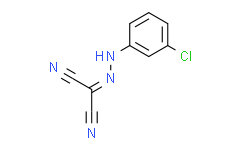CCCP inhibits IFN-β production induced by various types of the STING pathway activators. CCCP suppresses the phosphorylation of STING, TBK1, and IRF3 via disrupting the association of STING and TBK1. CCCP inhibits activation of STING and its downstream signaling molecules, TBK1 and IRF3, but not STING translocation to the perinuclear region. CCCP impairs the interaction between STING and TBK1 and concomitantly triggers mitochondria fission. Importantly, the knockout of the crucial mitochondria fission regulator Drp1 restored the STING activity, indicating that CCCP down-modulates the STING pathway through DRP1-mediated mitochondria fragmentation. The protonophore CCCP that disrupts membrane potential suppresses the DMXAA-triggered STING signaling pathway. CCCP drastically suppresses the production of IFN-β in DMXAA-treated RAW264.7 cells and MEFs.
As low as 1 μM CCCP is enough to induce mitocytosis. In cells treated with 10 μM CCCP, which is the dose used for inducing mitophagy, mitocytosis is barely induced. Mechanistically, mitocytosis requires positioning of damaged mitochondria at the cell periphery, which occurs because damaged mitochondria avoid binding to inward motor proteins.
Medlife has not independently confirmed the accuracy of these methods. They are for reference only.



 扫码关注公众号
扫码关注公众号